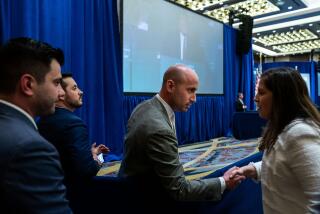3 Companies Honored for Helping to Advance Women
- Share via
Most women still haven’t risen above the “glass ceiling,” but three companies on Wednesday were recognized for at least helping some break through.
Hoechst Celanese Corp., Knight-Ridder Inc. and Texas Instruments Inc. won the 1996 Catalyst Award for their efforts to promote women within their corporate structures. Catalyst, a New York-based nonprofit organization that researches women’s issues, honored the businesses for linking women’s advancement to business goals and developing ways to tangibly measure their results.
Although some workplace diversity programs have been criticized for their outdated approaches and lack of results, these companies were honored because their programs evolved as women did, said Mary Mattis, vice president of research for Catalyst.
“Over time, we’ve raised the bar for this award,” Mattis said. “In the past, there was a tendency to focus only on family issues when dealing with women in the workplace. Now companies need to shift to women’s total career cycle.”
Mattis said each of the winning companies developed a “systemic” approach to combating barriers in corporate culture, by weaving diversity into business strategy. Among the more controversial programs is Hoechst Celanese’s Vertical Parity Initiative, which links 25% of manager bonuses to achieving diversity goals. Although critics charge that such programs encourage reckless advancement for monetary gain, Hoechst says it just gives employees a stronger sense of the company’s commitment.
“When a manager knows his bonus will be affected by his attitude toward diversity, it sends a signal that we are equating employee behavior with business,” said Clyde Jones, director of Hoechst’s quality work/life initiative.
Texas Instruments created what it calls the “Dashboard,” a type of yardstick that tracks areas ranging from the company’s retention of female employees to promotion rate and hiring. Tegwyn Pulley, the company’s manager of diversity, said the company did not just start a program, it changed its entire corporate culture. “Everything is results based. What becomes important is achieving business goals,” Pulley said.
Knight-Ridder scored points for its implementation of a mandate that required all units to create numerical targets based on the diversity of their communities.
But critics still question the necessity of programs aimed at advancing women in the workplace. For example, Christine O’Donnell, a spokeswoman for Concerned Women for America, a nonpartisan women’s organization, says there are enough laws to counter gender discrimination in the workplace, that those laws just need to be enforced. Diversity programs sometimes hurt women and produce reverse discrimination suits, the organization argues.
“We have to examine programs like these and ask: Are these women being advanced because they are qualified, or because they need more women?,” she said.
Texas Instruments’ Pulley disagrees. “We certainly don’t look at this award as the end,” she said.
Previous winners of the award include Pitney Bowes Inc., Motorola, Hewlett-Packard Co., American Airlines, McDonald’s Corp., John Hancock Financial Services, Mobil Corp. and Gannett Co.
More to Read
Inside the business of entertainment
The Wide Shot brings you news, analysis and insights on everything from streaming wars to production — and what it all means for the future.
You may occasionally receive promotional content from the Los Angeles Times.










